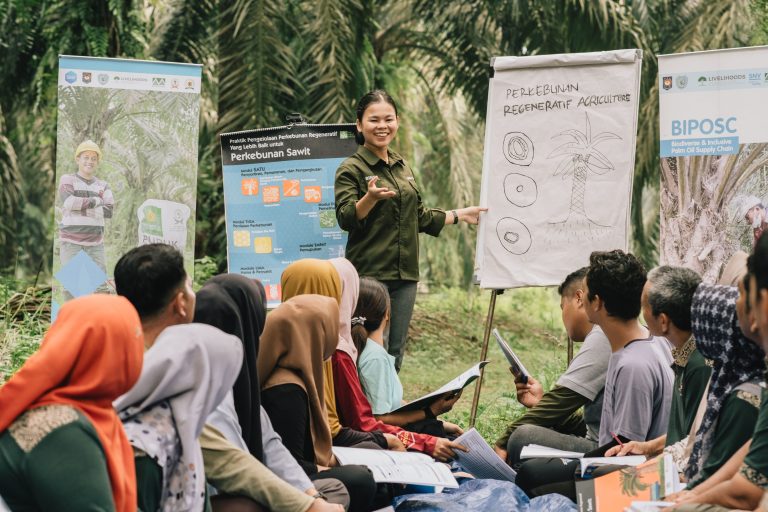A collaborative initiative to promote sustainable palm oil farming is helping independent smallholders in North Sumatra boost their livelihoods and protect the environment. The Biodiverse & Inclusive Palm Oil Supply Chain (BIPOSC) project, launched in 2021, aims to create a deforestation-free palm oil supply chain by regenerating degraded land, restoring biodiversity, and improving farming techniques in the region.
BIPOSC, led by Musim Mas Group in partnership with the Livelihoods Fund for Family Farming (L3F), SNV Indonesia, and World Agroforestry (ICRAF), focuses on independent oil palm smallholders in Labuhanbatu, North Sumatra. Through this project, farmers are being equipped with regenerative agricultural techniques that promote sustainable palm oil production while enhancing the local ecosystem.
One of the key elements of the initiative is the introduction of regenerative agriculture, which helps smallholders maintain soil health, prevent erosion, and reduce their reliance on chemical fertilisers. As the palm oil industry faces growing scrutiny over its environmental impact, Musim Mas has taken a leadership role in promoting sustainability. The company has been encouraging smallholders to form associations, providing them with better access to resources, certifications, and training in sustainable farming.
Rob Nicholls, General Manager of Projects & Programs at Musim Mas, highlighted the importance of smallholders in the sustainability movement. “Smallholders are key to achieving palm oil sustainability, and that’s why we lead Indonesia’s most extensive smallholder programme. By collaborating with partners, we aim to improve smallholders’ knowledge of regenerative agriculture and agroforestry. These techniques not only help smallholders become part of a sustainable supply chain but also provide them with alternative income sources during periods when their crops are less productive,” he said.
In addition to promoting sustainable farming practices, the BIPOSC project has provided training to over 1,000 independent smallholders, covering a total of 1,063 hectares. Training includes the use of bio-inputs, mulching, cover crops, and integrated pest management to reduce the need for chemical pesticides and fertilisers. The project also set up seven demonstration plots where farmers can observe these techniques in practice.
Capacity building is another key focus, with the establishment of a composting unit managed by the local farmers’ association, APSKS LB. The unit has the capacity to produce up to 150 tonnes of compost per month, which is sold to member farmers at half the market price. In 2023, its first year of operation, the unit produced 588 tonnes of compost, generating a profit of IDR 421 million. This successful model has helped farmers adopt composting, improving soil health and reducing costs.
Bernard Giraud, Co-Founder of the Livelihoods Fund for Family Farming, noted that farmers are now reporting higher yields and healthier soils as a result of the programme. “When we first visited smallholders, their main concern was access to fertilisers, but they needed more knowledge about soil health. We’re pleased to see that the BIPOSC project has addressed this, leading to healthier plots and increased yields.”
With independent smallholders managing 41% of Indonesia’s oil palm plantations, a figure expected to rise to 60% by 2030, the BIPOSC project offers a replicable model for sustainable palm oil production.

